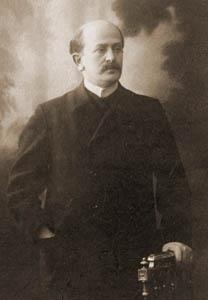Alexander Issajewitsch Braudo
Alexander Isayevich Braudo ( Russian Александр Исаевич Браудо ; born November 28 . Jul / 10. December 1864 greg. In Wilkomir , † 8. November 1924 in London ) was a Lithuanian - Russian historian and librarian .
Life
Braudo attended high school in Vladimir and then studied at the historical - philological faculty of the University of Dorpat with a degree as a candidate .
In 1989 Braudo joined the Ministry of Public Enlightenment in St. Petersburg , which immediately sent him to the local public library to work as a one-year volunteer in the legal department . He also carried out historical studies. In 1894 he became head of this department. He was a member of the Fund for Mutual Aid of Letters and Scholars as well as of the Association of Jewish Youth. He was part of the management of the Allgemeine Wohl publishing house and worked on the Brockhaus-Efron encyclopedia. In 1900 he became a librarian , appointed college assessor and a member of the Russian Bibliological Society . In 1902 he took over the management of the Rossica department of the public library. He participated in the work of the literacy committee and was a member of the Free Economic Society , the Committee of Savings and Credit Cooperatives, the Jewish Colonization Society in St. Petersburg and the Office for Political Defense (together with Henrich Sliosberg , Leon Bramson , Moissei Krol and others). In 1903 he became a member of the Board of Trustees for Domestic Servants and the Society for the Promotion of Enlightenment among the Jews in Russia, in which the Jews of the capital met. He worked in the magazine Liberation and in the publishing house Gesellschaftshilfe . 1903–1906 he was a councilor, 1908 a councilor and 1909–1914 a councilor of state. In 1903 he became editorial secretary (until 1913) and in 1911 a member of the editorial board of Arbeiterhilfe magazine . He translated the foreign literature that was important for his auxiliary activities into Russian . During the Russian Revolution in 1905 , he and others organized a protest meeting in the public library.
Braudo was a key figure in the national Jewish movement in Russia. He was a member of the Jewish Historical- Ethnographic Society and 1905-1906 member of the Jewish Democratic Group. 1906–1916 he was department secretary of the Board of Trustees for St. Petersburg's Jewish Girls at the Russian Society for the Protection of Women. He directed the work of the illegal press office, which collected and published information on anti-Semitic politics . He himself collected materials on pogroms , the situation of the Jews and the government policy towards the Jews. He participated in the investigation of the murder of the publicists Grigori Iollos and Michail Herzenstein as well as in the exposure of Yevno Asef and organized foreign protests against the Beilis affair . He initiated the publication of the materials on the history of the counterrevolutionary movement in Russia that were confiscated by the government.
During the First World War he took part in the work of the Jewish Committee to Support War Victims and the Society for the Preservation of the Health of the Jewish Population. In 1916 he formed an auxiliary committee for workers under the auspices of Empress Alexandra Feodorovna .
After the February Revolution of 1917 , Braudo and others saved the city libraries and transferred them to the public library stacks (until 1924). He was chairman of the Society for Library Science until his death. After the October Revolution , he was elected Deputy Director of the Public Library in 1918. In 1919 he moved to the Odessa City Library , whose director he was 1920–1921. Together with others he worked out the history of the Jews in Russia in the context of the history of the Jewish people. He returned to Petrograd and resumed the post of deputy director of the public library. He took care of the acquisition of foreign literature and established a library cabinet for new foreign literature. In May 1924 he was sent to the major European libraries in Paris and London for agreements on the purchase and exchange of books for the public library. In Paris he founded the Russian Correspondence Information Office .
Braudo was a member of the Masonic Lodge Grand Orient of the Peoples of Russia in the tradition of the Lodge Grand Orient de France . He was married to Lyubov Iljinitschna born. Harkavy, with whom he had two children, the son Isai Alexandrowitsch Braudo , who became an organist , and the daughter Nadeschda Braudo (1894–1976), who became an artist and married the poet and artist Léon Zack .
Individual evidence
- ↑ Краткая еврейская энциклопедия: Браудо Александр (accessed February 23, 2017).
- ↑ Большая биографическая энциклопедия: Браудо, Александр Исаевич (accessed February 23, 2017).
- ↑ Браудо А. И .: Обзор литературы по русской истории за 1890 г . тип. М. М. Стасюлевича, St. Petersburg 1891.
- ↑ Браудо А. И .: Новые материалы для истории русско-голландских отношений . тип. В. С. Балашева и К °, St. Petersburg 1893.
- ^ E. Münsterberg: The poor care. Introduction to practical care activities. Призрение бедных: Руководство к практ. деятельности в области попечения о бедных . тип. М. М. Стасюлевича, St. Petersburg 1900.
- ↑ Т. И. Мнёва: Отдел попечения о еврейских девушках Санкт-Петербурга при Российском обществе защитын (February 23, 2017) accessed on February 23, 2017.
- ↑ История еврейского народа. Т. 12: История евреев в России . Мир, Moscow 1921.
| personal data | |
|---|---|
| SURNAME | Braudo, Alexander Issajewitsch |
| ALTERNATIVE NAMES | Браудо, Александр Исаевич (Russian) |
| BRIEF DESCRIPTION | Lithuanian-Russian historian and librarian |
| DATE OF BIRTH | December 10, 1864 |
| PLACE OF BIRTH | Wilkomir |
| DATE OF DEATH | November 8, 1924 |
| Place of death | London |
